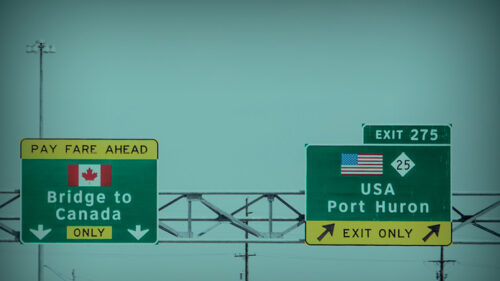Suitcase packed? Check. Passport in hand? Check. Gas in the car? Check. Auto insurance? Well…now, that’s a good question. Is your current auto insurance OK…or do you need special insurance if you’re planning a trip across the border to Canada? Again…good question…actually, it’s quite a common question, too.
Whether you’re planning on driving to Canada for work or for a short vacation, you may be surprised to find out you don’t need a special short-term auto policy. Canada is the only foreign country where U.S. auto liability insurance is recognized nationwide. As long as you’re traveling to Canada on a short-term basis, purchasing Canadian auto insurance isn’t required provided you have a valid U.S. driver’s license, registration, and auto insurance policy.
Now, having said that, it’s still important you check with your insurance company or insurance broker for a couple reasons.
- You’ll want to make sure the territory on your auto insurance policy will cover Canada.
- If you’re ever stopped, Canadian officials will often ask for (or require you to carry) a “Non-Resident Inter-Province Motor Vehicle Liability Insurance Card” issued by your U.S. insurance company. It’s strongly recommended you have this card with you. Your broker or insurance carrier can get this for you.
If you’re planning on moving to Canada or will be expatriated to Canada for any length of time (generally over 180 days), that’s where we need to talk about Canadian auto insurance. It’s something you should most definitely consider.
Canadian auto insurance is similar to insurance in the U.S. in that it’s compulsory for all drivers. Minimum limits of insurance in Canada are typically higher than the minimums we have in the U.S. Some provinces, like Prince Edward Island and Ontario, have partially Provincial or Government-run insurance programs.
OK…now that we’ve covered insurance, there are just a couple more items I want to touch on.
- Speed limits. Yep, Canada has them just like the U.S.; however, they’re displayed in metric (kilometers) not miles and are typically slower than in the U.S. Tricky!
- Street signs. They’re helpful for sure, but if you don’t know French, you may want to brush up on the language. French is a common language on street signs in Quebec.
- Legal issues. Driving while intoxicated (DWI) will get you a large amount of jail time immediately followed by deportation.
- Passport. As I mentioned right at the beginning, a passport is necessary. You’ll need it and any other federally approved travel documents to get in and out of Canada. The days of being able to cross the border without documentation is long gone.
- Employer letter. If you’re traveling for business, it’s a good idea to have your employer provide you a letter stating you’re applying for visitor status pursuant to Canada’s International Mobility Program of Section R186(a) of the immigration regulation. Your broker can give you further details on this.
Now that the critical details are out of the way…there’s just one last thing I want to say: “Enjoy the trip!”







